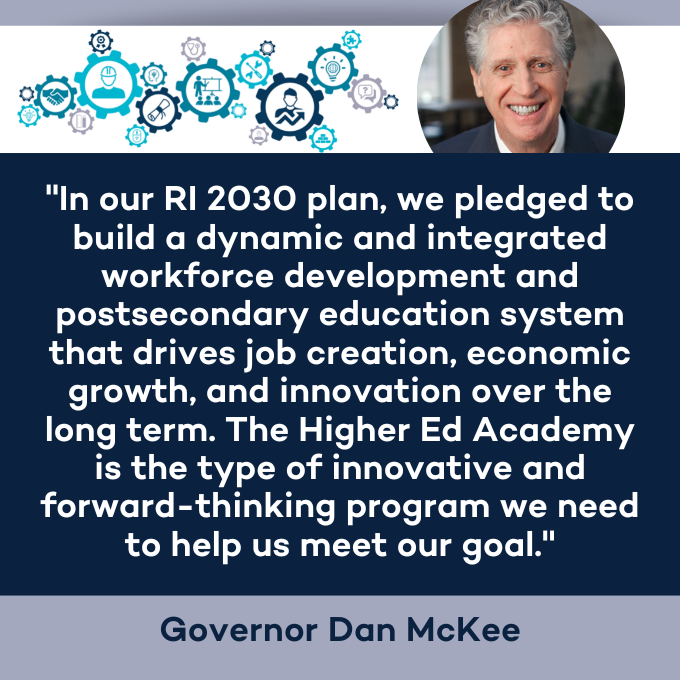Increasing college attainment has a clear impact on not only the lifetime earnings of an individual but also on the economic returns to the state.
by Amanda Winters and Jack Porter
When President Biden unveiled his first budget request, he proposed a new program to boost state efforts aimed at increasing retention and completion in postsecondary education. The “Retention and Completion Program” would have funded state-led efforts to implement evidence-based strategies such as comprehensive academic advising and emergency financial aid to improve student outcomes. And while the Retention and Completion Program has not been enacted at the federal level, Governors have taken the lead and launched their own efforts to improve college retention and completion rates in their states.
In his 2022 State of the State address, Governor Dan McKee unveiled a proposal to establish the “Rhode Island Higher Education Academy,” which would provide Rhode Islanders with similar support and wraparound services to those included in the proposed federal program.
“We must meet Rhode Islanders where they are, and help give them the personalized, hands-on help they need to earn their credentials from our colleges and universities. The Academy will help our state get more people back into the workforce in jobs that will not only earn them living wages but jobs that put them on the ground floor of careers.”
Governor Dan McKee
Rhode Island’s Higher Education Academy would serve residents who have not begun their postsecondary education journey or were formerly enrolled in a postsecondary education program. The Academy would deliver one to two months of programming for prospective students to ensure that they are well-prepared as they enroll or re-enroll. This programming would include services allowable under the proposed federal program – including advising, navigation support, and other wraparound services within local communities.
The Academy was designed by the Commissioner of Higher Education in Rhode Island, Shannon Gilkey, who believes in building a program based on a community network model that will leverage not only education providers but also non-profit organizations that offer individual and family support: “As good paying jobs become more dependent on higher ed credentials, the delivery of those credentials and educational services must become both localized to the community and the individual” This design, advancing the Governor’s vision for personalized and career-focused support, builds on evidence-based practices to boost college completion.

As Governors across the country pursue the scaling of effective attainment and career-connected strategies of this type, they can now refer to a suite of resources that highlights practices that have proven to increase student success. The newly published College Completion Strategy Guide – which was developed by higher education experts and project partners of the National Governors Association (NGA) Center for Best Practices – provides policymakers with an overview of the successful, evidence-based practices that can be scaled at the state level.
Effective implementation of evidence-based practices for student support and attainment requires continued investment in the gathering of data and the tailoring of programs to meet unique state and regional population needs. The “scaling” of these types of programs is not a plug-and-play process but instead requires an inclusive and responsive design to meet state needs. The proposed work in Rhode Island moves beyond a tuition-focused support model to address the other barriers or challenges to college completion that are facing Rhode Islanders.
Increasing college attainment has a clear impact on not only the lifetime earnings of an individual but also on the economic returns to the state. Beyond the purely financial impacts of investment, a college credential is associated with increased civic engagement, volunteering, happiness, life satisfaction, and better health and wellness, as well as lower incarceration rates and reliance on social services. When policymakers, such as Governor McKee, seek to focus investment on student support by aligning state and non-profit resources, they are investing beyond degree attainment and into lasting community impact.












